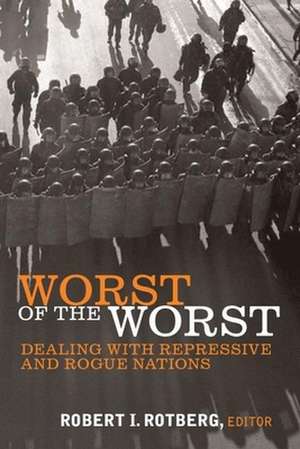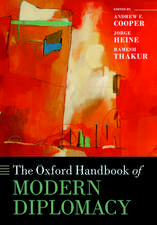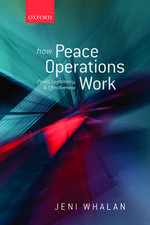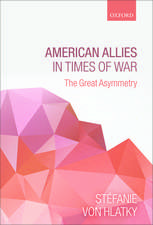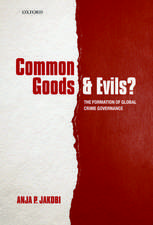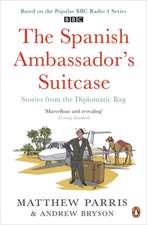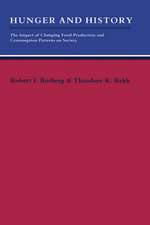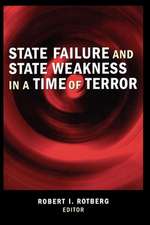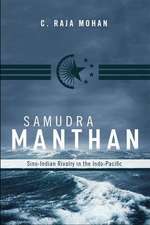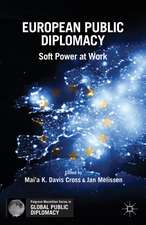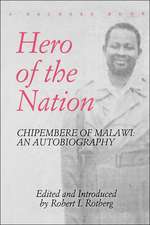Worst of the Worst: Dealing with Repressive and Rogue Nations
Editat de Robert I. Rotbergen Limba Engleză Paperback – 26 iul 2007
Repressive regimes tyrannize their own citizens and threaten global stability and order. These repositories of evil systematically oppress their own people, deny human rights and civil liberties, severely truncate political freedom, and prevent meaningful individual economic opportunity. Worst of the Worst identifies and characterizes the world's most odious states and singles out which repressors are aggressive and, hence, can truly be called rogues.
Previously, determinations have been based on inexact, impressionistic criteria. In this volume, Robert Rotberg and his colleagues define the actions that constitute repression and propose a method of measuring human rights violations. They offer an index of nation-state repressiveness, classifying "gross repressors," "high repressors," and "aggressive repressors" or "rogues" on a ten-point scale. Based on arms and drug trafficking, support of terror, possession of weapons of mass destruction, and crossborder attacks, this valuable diagnostic tool will guide the international community in crafting effective policies to deal with injustice in the developing world. The repressors and rogues profiled include Belarus, Burma, Equatorial Guinea, NorthKorea, Syria, Togo, Tunisia, Turkmenistan, Uzbekistan, and Zimbabwe. W orst of the Worst offers a transparent way to decide which repressive and rogue states are most deserving of strong policy attention. Explicitly measuring and labeling these highly repressive states is the first step toward improving the well-being of millions of the poorest and most abused peoples of the globe.
Contributors include Margarita M. Balmaceda (Seton Hall University), Mary Caprioli (University of Minnesota Duluth), Priscilla A. Clapp (Safe Ports, LLC),Yi Feng (Claremont Graduate University), Gregory Gleason (University of New Mexico), John Heilbrunn (Colorado School of Mines), Clement M. Henry (University of Texas at Austin),David W. Lesch (Trinity University), Marcus Noland (Peterson Institute for International Economics and International Food Policy Research Institute), Martha Brill Olcott (Carnegie Endowment for International Peace), Saumik Paul (Claremont Graduate University), and Peter F. Trumbore (Oakland University).
Previously, determinations have been based on inexact, impressionistic criteria. In this volume, Robert Rotberg and his colleagues define the actions that constitute repression and propose a method of measuring human rights violations. They offer an index of nation-state repressiveness, classifying "gross repressors," "high repressors," and "aggressive repressors" or "rogues" on a ten-point scale. Based on arms and drug trafficking, support of terror, possession of weapons of mass destruction, and crossborder attacks, this valuable diagnostic tool will guide the international community in crafting effective policies to deal with injustice in the developing world. The repressors and rogues profiled include Belarus, Burma, Equatorial Guinea, NorthKorea, Syria, Togo, Tunisia, Turkmenistan, Uzbekistan, and Zimbabwe. W orst of the Worst offers a transparent way to decide which repressive and rogue states are most deserving of strong policy attention. Explicitly measuring and labeling these highly repressive states is the first step toward improving the well-being of millions of the poorest and most abused peoples of the globe.
Contributors include Margarita M. Balmaceda (Seton Hall University), Mary Caprioli (University of Minnesota Duluth), Priscilla A. Clapp (Safe Ports, LLC),Yi Feng (Claremont Graduate University), Gregory Gleason (University of New Mexico), John Heilbrunn (Colorado School of Mines), Clement M. Henry (University of Texas at Austin),David W. Lesch (Trinity University), Marcus Noland (Peterson Institute for International Economics and International Food Policy Research Institute), Martha Brill Olcott (Carnegie Endowment for International Peace), Saumik Paul (Claremont Graduate University), and Peter F. Trumbore (Oakland University).
Preț: 264.09 lei
Nou
Puncte Express: 396
Preț estimativ în valută:
50.54€ • 52.57$ • 41.72£
50.54€ • 52.57$ • 41.72£
Carte tipărită la comandă
Livrare economică 15-29 aprilie
Preluare comenzi: 021 569.72.76
Specificații
ISBN-13: 9780815775676
ISBN-10: 0815775679
Pagini: 342
Dimensiuni: 152 x 229 x 23 mm
Greutate: 0.49 kg
Editura: Brookings Institution Press
Colecția Brookings Inst. Press/World Peace Fdn.
ISBN-10: 0815775679
Pagini: 342
Dimensiuni: 152 x 229 x 23 mm
Greutate: 0.49 kg
Editura: Brookings Institution Press
Colecția Brookings Inst. Press/World Peace Fdn.
Notă biografică
Robert I. Rotberg is director of the Program on Intrastate Conflict, Conflict Prevention, and Conflict Resolution at Harvard University's John F. Kennedy School of Government, and president of the World Peace Foundation. Rotberg is the author or editor of numerous books, including State Failure and State Weakness in a Time of Terror (Brookings/WPF, 2003).
Descriere
A Brookings Institution Press and World Peace Foundation publication
Repressive regimes tyrannize their own citizens and threaten global stability and order. These repositories of evil systematically oppress their own people, deny human rights and civil liberties, severely truncate political freedom, and prevent meaningful individual economic opportunity. Worst of the Worst identifies and characterizes the world's most odious states and singles out which repressors are aggressive and, hence, can truly be called rogues.
Previously, determinations have been based on inexact, impressionistic criteria. In this volume, Robert Rotberg and his colleagues define the actions that constitute repression and propose a method of measuring human rights violations. They offer an index of nation-state repressiveness, classifying "gross repressors," "high repressors," and "aggressive repressors" or "rogues" on a ten-point scale. Based on arms and drug trafficking, support of terror, possession of weapons of mass destruction, and crossborder attacks, this valuable diagnostic tool will guide the international community in crafting effective policies to deal with injustice in the developing world. The repressors and rogues profiled include Belarus, Burma, Equatorial Guinea, NorthKorea, Syria, Togo, Tunisia, Turkmenistan, Uzbekistan, and Zimbabwe.
W orst of the Worst offers a transparent way to decide which repressive and rogue states are most deserving of strong policy attention. Explicitly measuring and labeling these highly repressive states is the first step toward improving the well-being of millions of the poorest and most abused peoples of the globe.
Contributors include Margarita M. Balmaceda (Seton Hall University), Mary Caprioli (University of Minnesota Duluth), Priscilla A. Clapp (Safe Ports, LLC),Yi Feng (Claremont Graduate University), Gregory Gleason (University of New Mexico), John Heilbrunn (Colorado School of Mines), Clement M. Henry (University of Texas at Austin),David W. Lesch (Trinity University),
Repressive regimes tyrannize their own citizens and threaten global stability and order. These repositories of evil systematically oppress their own people, deny human rights and civil liberties, severely truncate political freedom, and prevent meaningful individual economic opportunity. Worst of the Worst identifies and characterizes the world's most odious states and singles out which repressors are aggressive and, hence, can truly be called rogues.
Previously, determinations have been based on inexact, impressionistic criteria. In this volume, Robert Rotberg and his colleagues define the actions that constitute repression and propose a method of measuring human rights violations. They offer an index of nation-state repressiveness, classifying "gross repressors," "high repressors," and "aggressive repressors" or "rogues" on a ten-point scale. Based on arms and drug trafficking, support of terror, possession of weapons of mass destruction, and crossborder attacks, this valuable diagnostic tool will guide the international community in crafting effective policies to deal with injustice in the developing world. The repressors and rogues profiled include Belarus, Burma, Equatorial Guinea, NorthKorea, Syria, Togo, Tunisia, Turkmenistan, Uzbekistan, and Zimbabwe.
W orst of the Worst offers a transparent way to decide which repressive and rogue states are most deserving of strong policy attention. Explicitly measuring and labeling these highly repressive states is the first step toward improving the well-being of millions of the poorest and most abused peoples of the globe.
Contributors include Margarita M. Balmaceda (Seton Hall University), Mary Caprioli (University of Minnesota Duluth), Priscilla A. Clapp (Safe Ports, LLC),Yi Feng (Claremont Graduate University), Gregory Gleason (University of New Mexico), John Heilbrunn (Colorado School of Mines), Clement M. Henry (University of Texas at Austin),David W. Lesch (Trinity University),
